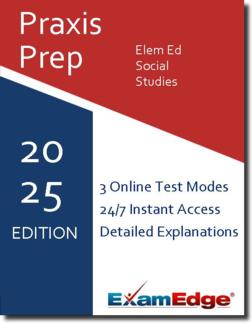Praxis Elem Ed Social Studies (5904) Practice Tests & Test Prep by Exam Edge - Topics
Based on 32 Reviews
- Real Exam Simulation: Timed questions and matching content build comfort for your Praxis Elem Ed Social Studies test day.
- Instant, 24/7 Access: Web-based Praxis Elementary Education Social Studies practice exams with no software needed.
- Clear Explanations: Step-by-step answers and explanations for your Praxis exam to strengthen understanding.
- Boosted Confidence: Reduces anxiety and improves test-taking skills to ace your Praxis Elementary Education Social Studies (5904).

Understanding the exact breakdown of the Praxis Elementary Education Social Studies test will help you know what to expect and how to most effectively prepare. The Praxis Elementary Education Social Studies has 60 multiple-choice questions The exam will be broken down into the sections below:
| Praxis Elementary Education Social Studies Exam Blueprint | ||
|---|---|---|
| Domain Name | % | Number of Questions |
| United States History, Government, and Citizenship | 45% | 27 |
| Geography, Anthropology, and Sociology | 30% | 18 |
| World History and Economics | 25% | 15 |


